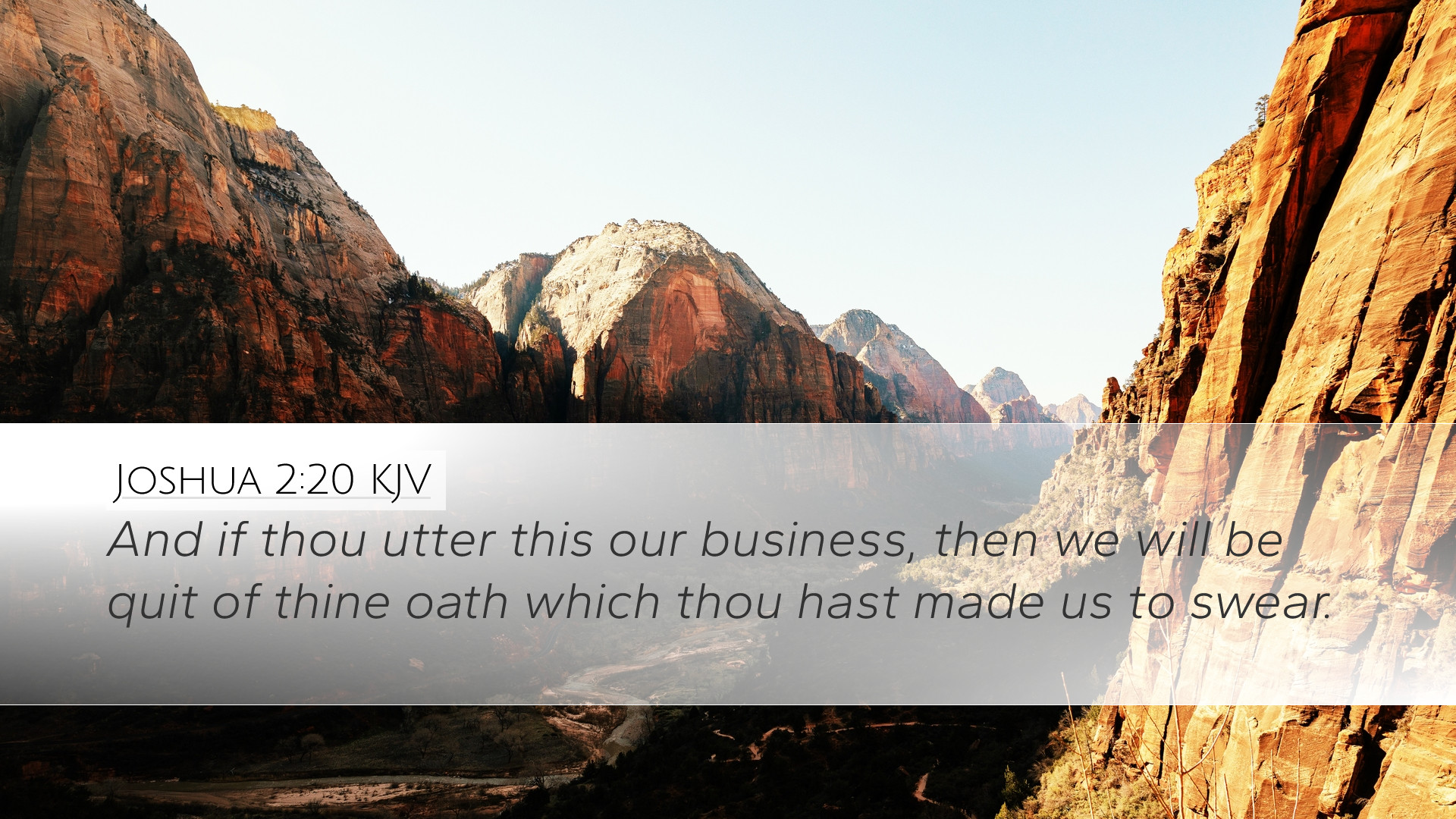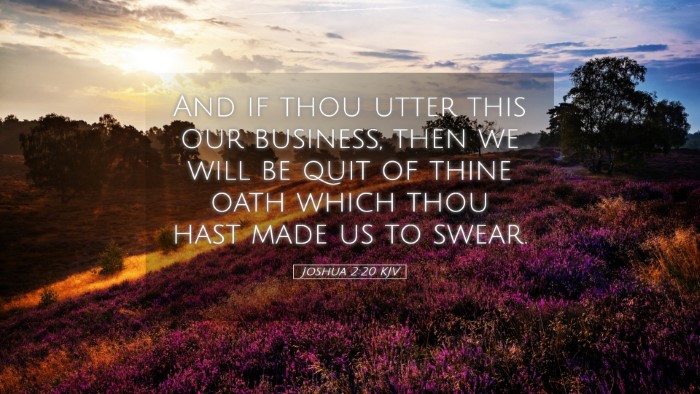Old Testament
Genesis Exodus Leviticus Numbers Deuteronomy Joshua Judges Ruth 1 Samuel 2 Samuel 1 Kings 2 Kings 1 Chronicles 2 Chronicles Ezra Nehemiah Esther Job Psalms Proverbs Ecclesiastes Song of Solomon Isaiah Jeremiah Lamentations Ezekiel Daniel Hosea Joel Amos Obadiah Jonah Micah Nahum Habakkuk Zephaniah Haggai Zechariah MalachiJoshua 2:20
Joshua 2:20 KJV
And if thou utter this our business, then we will be quit of thine oath which thou hast made us to swear.
Joshua 2:20 Bible Commentary
Commentary on Joshua 2:20
Verse: Joshua 2:20 - "But if you tell this business of ours, then we will be quit of your oath which you have made us to swear."
Introduction
The narrative of Joshua 2 delivers a significant episode in the preparation for the conquest of Canaan. The verse in question captures a critical moment in the interactions between Rahab, the Israelite spies, and the implications of the covenant forged between them. This commentary seeks to delve into the theological, historical, and practical implications of this verse.
Contextual Background
The broader context of Joshua 2 is foundational to understanding this verse. The Israelites, under Joshua's leadership, are preparing to enter the Promised Land. The reconnaissance mission undertaken by the spies reveals God's providential care and the faith display of Rahab amid impending judgment on Jericho.
Thematic Insights
- The Nature of Oaths: The request made by Rahab serves to highlight the serious nature of oaths in ancient Israelite culture. As noted by Matthew Henry, the covenant made by the spies reflects an unbreakable bond and showcases the seriousness with which such agreements were taken.
- Faith and Pragmatism: Albert Barnes interprets Rahab's words as a demonstration of her faith in the God of Israel. Her actions show a blending of faith and practical wisdom, as she was willing to ensure her family's safety through a calculated risk and allegiance toward Israel.
- Judgment and Mercy: The juxtaposition of judgment (on Jericho) and mercy (extended to Rahab and her family) is evident. This theme, emphasized by Adam Clarke, illustrates God's grace towards those who may not be seen as deserving, anchoring a significant theological truth about divine mercy and redemption.
Character Study: Rahab
Rahab’s character looms large in this passage. Described as a harlot, her faith in the God of Israel sets her apart from the Canaanites. Matthew Henry suggests she served as a prototype of genuine faith, as she acted on the belief in the sovereignty of Israel’s God. Her story is a powerful testament to the redemptive potential of anyone who turns to God, regardless of their past.
Historical Perspective
In the ancient Near Eastern context, the act of swearing an oath was of profound importance. Albert Barnes indicates that the binding nature of such oaths had legal and social ramifications, ensuring that the individuals involved were held accountable to their agreements. This was reflective of a covenantal culture that permeated the social fabric of Israel and surrounding nations.
Practical Application
- Integrity in Promises: This scripture serves as a reminder of the importance of maintaining one’s word. Pastors and leaders are called to instill this principle within their congregations.
- Embracing Redemption: The story of Rahab encourages believers to embrace the grace of God. Rahab’s transformation reflects the fundamental Christian teaching that anyone can come to faith and find redemption.
- Cultural Engagement: The interaction between Rahab and the spies epitomizes a model of engaging with a culture different from one's own. This is particularly relevant for modern-day Christians navigating diverse cultural landscapes.
Theological Reflections
On a theological level, Joshua 2:20 foreshadows the inclusivity of God's mercy. It anticipates the radical shift seen in the New Testament, where salvation extends beyond ethnic and cultural boundaries. Adam Clarke points out that God's redemptive plan is thoroughly rooted in His character, demonstrating love and mercy even to those outside the covenant community.
Conclusion
Joshua 2:20 encapsulates a moment of strategic alliance fortified by faith and necessity. The verse invites readers to reflect on the nature of their commitments and the redemptive narrative woven throughout scripture. As pastors, students, and scholars delve into this scripture, they are encouraged to profound insights regarding faith, mercy, and the overarching narrative of God’s engagement with humanity.


